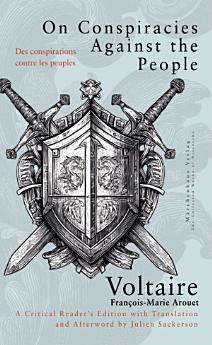Conspiracies Against the People
About this ebook
In tone, it is more sober and historical than the soaring invective of the Treatise on Tolerance, but it is just as driven by indignation at cruelty. Written as an "editorial supplement" to his tragedy Le Triumvirat (Octavian and the Young Pompey), it alternates between scholarly commentary and impassioned criticism. For example, Voltaire's preface to his editor (quoted in scholarly introductions) explains that he wanted the anonymous notes on prohibitions to accompany the play's publication in order to engage readers with more philosophical material. The text itself is not widely anthologized, but it lists case after case of what he considers unjust bloodshed imposed by rulers or mobs.
Voltaire began writing Des conspirations contre les peuples in April 1766, after a failed attempt to stage Le Triumvirat in Paris. He wrote to his secretary D'Argental that he was outlining a history of prohibitions from the biblical deed of the Levites to the present day (including the executions of French Protestants in the Cevennes). The work was intended to accompany the printed edition of the play; accordingly, when Jacques Lacombe published Octave et le jeune Pompée, ou le Triumvirat (1766), he included Voltaire's notes and essays at the end. Conspiracies was thus published anonymously as part of this collection in Paris in December 1766. In this way, Voltaire evaded censorship by hiding the tract within more acceptable "theatrical notes," and readers in France encountered it as a scholarly appendix rather than a separate work. The context of the writing reflects Voltaire's late-career efforts to combat intolerance and tyranny through any available genre.
This modern Critical Reader’s Edition includes an illuminating afterword tracing Voltaire’s intellectual relationships with Enlightenment thinkers and philosophers (including Locke, Diderot, Rousseau and Newton), containing unique research into his influences and economic attachments, a comprehensive timeline of his life and works, a glossary of Enlightenment terminology, and a detailed index of all of Voltaire’s writings. This unique professional translation renders Voltaire’s sharp, satirical prose into modern language to preserve the original clarity and movement of the text. Combined with the scholarly amplifying material, this edition is a groundbreaking exploration of Voltaire’s classic works and his enduring artistic and philosophical influence, and influence on modern Protestant-Atheistic Theology.







